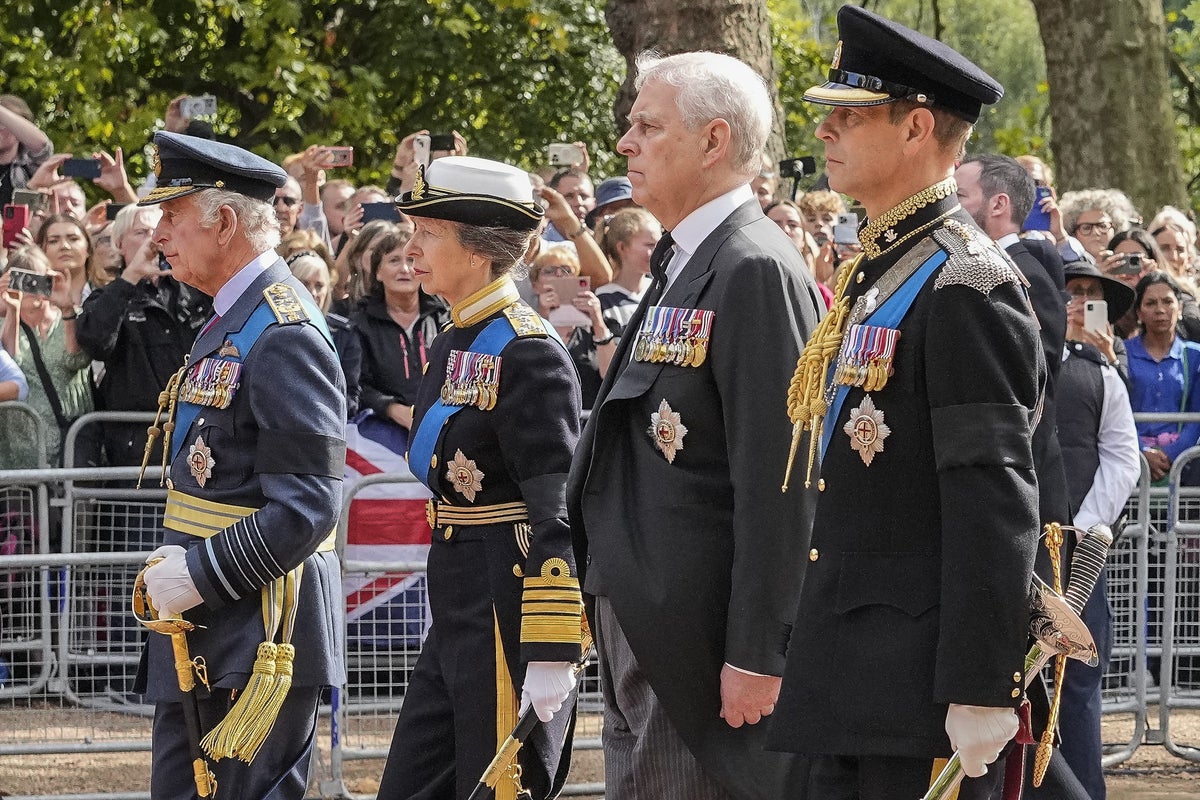
The number of members of the royal family who can stand in for the King when he cannot fulfil certain official duties is to be extended to include the Princess Royal and the Earl of Wessex.
The King’s intention was announced in a signed message read to the House of Lords by the Lord Chamberlain, Lord Parker of Minsmere, who is the most senior official in the royal household.
Charles said the aim of the increase was to “ensure continued efficiency of public business when I am unavailable”.
Counsellors of State, who can deputise for the monarch if he is overseas on an official trip or ill, include the Duke of Sussex, who lives in California after stepping down as a working royal, and the disgraced Duke of York.
Provisions for the counsellors are made under the Regency Acts 1937 to 1953 and those who can currently stand in for Charles include the Queen Consort, and the four most senior adults in the line of succession – Prince of Wales, Harry, Andrew and Princess Beatrice.
During the late Queen’s reign, the Counsellors of State dilemma was left unresolved, with sources saying there would be no change in the law despite the scandal surrounding Andrew, and Harry’s permanent departure for the US.
Public debate and pressure to resolve the situation increased when the Queen caught Covid and became increasingly frail.
But the King has moved, just two months after his accession, to address the issue, appearing to underline there is no way back into public life for his brother Andrew, as well as sidelining his son Harry.
The King, however, opted to ask for a less drastic option by seeking to add Anne and Edward, rather than removing Andrew and Harry entirely from the list.
The message was read out on the King’s 74th birthday.
Speaking at the despatch box in the upper chamber, Lord Parker said he had the honour to present a message from the King “signed by his own hand”.
The independent crossbencher told peers: “The message is as follows: ‘To ensure continued efficiency of public business when I am unavailable such as while I am undertaking official duties overseas, I confirm that I would be most content, should Parliament see fit, for the number of people who may be called upon to act as Counsellors of State under the terms of the Regency Acts 1937 to 1953 to be increased to include my sister and brother – the Princess Royal and the Earl of Wessex and Forfar – both of whom have previously undertaken this role’.”
There were approving shouts of “hear, hear” from the red benches at the end of the King’s message being read out.
It comes after Labour Peer Viscount Stansgate, the son of the late left-wing firebrand Tony Benn, recently questioned the current list of royals able to officiate when the King is not available, given it included Andrew and Harry “one of whom has left public life and the other of whom has left the country”.
It is thought any changes to legislation to increase the number of counsellors would be completed later this year before the prospect of the King and Queen Consort going on overseas tours in 2023, which may coincide with the Prince and Princess of Wales also being out of the country.
Counsellors of State are authorised to carry out most of the official duties of the Sovereign like attending Privy Council meetings, signing routine documents and receiving the credentials of new ambassadors to the UK.
But certain core constitutional functions cannot be delegated, like appointing a prime minister or creating peers.
Joe Little, of Majesty magazine, told the PA news agency: “The counsellor of state situation should have been sorted out in the previous reign, but I can see why it wasn’t.
“Her late Majesty, rather like her mother the Queen Mother, avoided family conflict whenever possible.
“The steps the King is taking can hardly be perceived as a snub to the Dukes of York and Sussex because they remain in the equation and, in theory, could be called upon to fulfil the role at some point in the future.
“That seems highly unlikely, however, particularly with Prince Andrew, who, if he has not already done so, should now regard himself as a permanently retired member of the royal family.”
Andrew stepped down from public life over his friendship with paedophile billionaire Jeffrey Epstein in 2019.
The late Queen’s second son went on to pay millions to settle a civil sexual assault case to a woman he claimed never to have met.
The message was also delivered in the House of Commons.
Raising a point of order, Commons Leader Penny Mordaunt said: “It may be of help if I inform the House that honourable members will have the opportunity to consider a response to His Majesty’s gracious message ahead of the Opposition Day debate tomorrow.
“It may also help if I inform the House that there will be legislation relating to this message for the House to consider in due course. Should the House agree to the humble address as first business tomorrow, that legislation will provide a proper opportunity to debate the matter that has been raised.”
Buckingham Palace has declined to comment.
A spokesman for the House of Lords said it was a question for the Government as to if and when they will introduce a Bill.
Anne was previously a Counsellor of State between 1971, when she turned 21, and 2003, when she was replaced by William when he reached his 21st birthday.
Edward was a Counsellor between 1985, at the age of 21, until 2005 when his nephew Harry turned 21.







